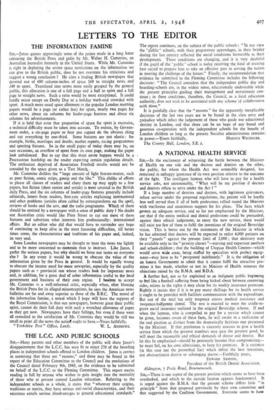LETTERS TO THE EDITOR
THE INFORMATION FAMINE
SIR,—Janus quotes approvingly some of the points made in a long letter censuring the British Press and radio by Mr. Walter H. Cummins, an Australian journalist formerly in the United States. While Mr. Cummins is right in deploring the severe space restrictions on the information we can give to the British public, does he not overstate his criticisms and suggest a wrong conclusion ? He cites a leading British newspaper that devoted out of 690• column-inches of space 169 to straight news and 249 to sport. .Translated into terms more easily grasped by the general public, this allocation is one of a full page and a half to sport and a full page to straight news. Such a ratio would be most exceptional. It could hardly occur except on Derby Day or a holiday week-end crowded with sport. A much more usual space allotment in the popular London morning papers would be a page (or rather less) for sport, nearly two pages for other news, about six columns for leader-page features and about six columns for advertisements.
If it is held that even that proportion of space for sport is excessive, a technical difficulty must be taken into account. To reduce, by Govern- ment order, a six-page paper to four you cannot do the obvious thing and cut everything by one-third. Some features are not elastic: for example, births, marriages and deaths, market reports, racing programmes and sporting fixtures. So in the small paper of today there may be, on rare occasions, an overflow of sport from its own page, making the paper look unbalanced. But to say that this must never- happen would be a Procrustean hardship on the reader expecting certain regulation details. The enthusiast deprived of Association Football results would not be consoled by the space given to a Test Match.. .
Mr. Cummins dislikes the "large amount of light feature-matter, such as poor fiction, comic strips, gossip and the like." This dislike of efforts to please all classes of readers and cheer them up may apply to a few papers, but fiction (short stories and serials) is most unusual in the British daily Press, and the six columns of leader-page features generally include editorials, letters from readers, first-rate articles explaining international and other problems (articles often cabled by correspondents on the spot), reviews of books and the arts, and the radio programme. Which of these should be omitted by a newspaper with a sense of public duty ? No doubt our Australian critic would like Fleet Street to cut out most of these features and substitute what interests him professionally: international affairs. But an editor who did that would have to surrender any hope of continuing to keep alive in the most harassing difficulties, till better times come, the characteristics •and traditions of his paper and, indeed, its very soul.
Some London newspapers may be thought to treat the news too lightly and to be more concerned to .entertain than to instruct. - Like Janus, I prefer the serious papers, but why should we force our tastes on everyone else ? In any event it would be wrong to obscure the value of the information given by the Press in general. It would be equally wrong to obscure the intense need for more newsprint, especially by the quality papers such as t provincial one whose readers look for important news and, in addition, for a great deal of sober information useful to the local government and business of their own region. I hesitate to accept Mr. Cummins ns a well-informed critic, especially when, after blaming the British Press for its alleged misconceptions, he says the American news bulletins are far and away superior to those of the B.B.C. The moral of the information famine, a moral which I hope will have the support of the Royal Commission, is that our newspapers, however great their public spirit, cannot do their full duty with such a wretched allowance of paper as they get now. Newspapers 'have their failings, but even if these were all remedied to the satisfaction of Mr. Cummins they would be still too small to print all the news the nation ought to have.—Yours faithfully,






























 Previous page
Previous page